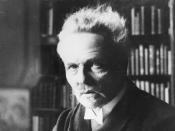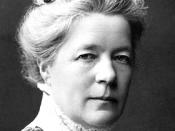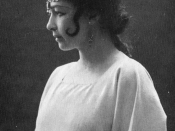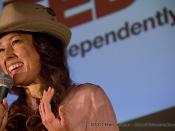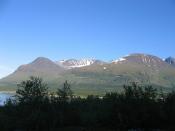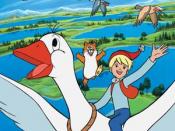Throughout literature, strong female characters have shown up in some of the most surprising places. Characters one never dreamt would be considered female role models have emerged, as women characters first thought to be strong females have shown themselves to be lacking. It is this way when one considers the character of Akka from Selma Lagerlöf's The Wonderful Adventures of Nils and the Further Adventures of Nils and Indra's daughter from August Strindberg's A Dream Play. Akka is a wild goose, while Indra's daughter is goddess-like being on a mission to ease the suffering of the world; at first, it seems very clear cut on which character would be the stronger one. However, Akka, despite being an animal, is a more well-rounded and stronger female character than Indra's daughter.
It is certainly no accident that Akka's creator is the female writer Selma Lagerlöf while August Strindberg created Indra's daughter. While Lagerlöf creates strong and powerful female characters in The Wonderful Adventures of Nils, Strindberg's A Dream Play reflects his prejudices and misconceptions about women.
The reader first gets a glimpse into this prejudice when the name of the character of Indra's daughter. Unlike Akka, she is not her own person, but is defined by her relationship with a man. It is certainly true that her relationship with a man later in the play further defines her. It would not be fair to call Indra's daughter a woman at first, certainly not in the earthly sense. As we are first introduced to her, Indra's daughter is a godlike being, sent on a mission by her father to observe the sorrows of humankind. She does so, viewing everything at a distance, until she suggests to the Advocate that they become married. Once they are married, she becomes a human woman, even acquiring the human name of Agnes. It is then and only then that she begins to become truly involved with the reality of human life, and she suffers for it. The character becomes the stereotype of the "desperate housewife," with her loathing of her child, her husband and the squalor that they live in together.
As soon as this happens, she is seen as subjugated, a lesser character than she was previously, with trivial thoughts and desires. She talks not about the condition of mankind, but of her own discomfort. Being a human woman is stifling her spirit, as is seen by her constant complaints that she feels she is suffocating. Her task now is not to record the heaviness of the world's sorrows, but to keep the house clean and therefore give her husband some happiness. Her duty as a human woman is also of a lesser nature: she is responsible for her child, her husband and her home. Her duties as a godlike character are much more lofty and complicated: to record the world's sorrows and bring back the human complaint to the heavens. However, in the end, she chooses the higher of the two duties; she chooses to burn herself in the fire so that she can once again ascend to the heavens. One might argue that she is choosing the more selfless goal as she gives up her life to help the rest of the world. However, her decision is really motivated by selfish motives. This is made clear by the brief presence of Kristin just before Indra's daughter sacrifices herself. She is reminded of the hatred she feels towards her family, her distaste for the simple life of a human woman and she chooses to escape it. She rationalizes her abandoning of her female life by saying that she must attend to her "highest" duty first, which is the duty she has to mankind. However, shortly after, Indra's daughter has this following exchange with the Poet: POET. Tell me. Was it not Indra who once sent his son to earth to listen to man's complaints? DAUGHTER. It wasâ¦. was not man's condition bettered after his visit? Answer truthfully.
POET. Bettered? Yes, a little. Very little. (Strindberg 250) The Poet admits that Indra's son did not improve mankind's condition in any sort of substantial way, and it is unlikely that Indra's daughter will make life for man much better as well. On the other hand, Indra's daughter is made aware by the Advocate that by choosing to perform her godlike duty and neglect her earthbound duty she is causing suffering in the world: "Your child misses you. Can you understand that a human being is suffering for you?" (Strindberg 248). The Advocate's plea does not affect Indra's daughter's final decision. She steps into the fire and flees the "lesser" life of a woman.
Akka, on the other hand, may be viewed as more than a woman that Indra's daughter ever was and ever could be, despite the fact that she is a goose. She is the undisputed leader of the most respected group of wild geese in Sweden despite the fact that she is female and getting rather old. Oftentimes, when woman are in positions of power, there seems to be a temptation to get rid of characteristics that are stereotypically dubbed female, like compassion and empathy. Instead, many women choose to present themselves as if they were a man in order to gain respect and power. Akka manages to avoid this temptation. She is generally a rather severe figure, but she keeps many stereotypically motherly characteristics. This is especially seen in her interactions with Gorgo, the eagle. Despite the fact that she knows eagles are natural predators to geese, she puts her life on the line to feed and then raise the orphaned eaglet: Akka began to think that the eagles had really been shot, and she reasoned that if she were to let the eaglet stare she might perhaps be rid of the whole robber tribe for all time. But it went very much against her not to succor a deserted young one so far as she could. (Lagerlöf 115) However, as we can also see from her relationship with Gorgo, Akka is not without her vices. She is quick to judge Gorgo negatively when he begins to desire to be the eagle he really is and she can definitely be stubborn, as is shown by the fact that she refuses to speak of Gorgo for such a long time. She is a well-rounded character who, like Indra's daughter, has contrasting duties. She is responsible for the safety and well-being of her flock but is torn by her affection for Nils, something that goes against her nature as a wild animal scared of humans. However, unlike Indra's daughter, Akka chooses not to neglect any of her duties. Instead, she works to achieve both duties: the more selfless duty towards her flock and her selfish affection for Nils.
It is perhaps strange to think of a female goose as a role model for young girls as opposed to a savior-like goddess. However, this has much to do with the personalities, beliefs and objectives of the two authors. Much has been said about Strindberg's misogyny, and there certainly seems to be some aspects of that in the character of Indra's daughter, especially regarding her behavior as the human female Agnes. On the other hand, Lagerlöf was a proponent of women's rights, as well as the obvious fact that she was a woman herself. However, it is not simply because of the author's own personalities that Akka is a stronger character than Indra's daughter. The traits that she was created with, the actions that she undertakes, all of that would be the same if Akka were a male. Indra's daughter, contrastingly, is a character built strongly on various stereotypes of females; if the character was to be made male, the character would completely disintegrate.
Works Cited Lagerlöf, Selma. The Wonderful Adventures of Nils and the Further Adventures of Nils.
London: Puffin Books, 1999.
Strindberg, August. A Dream Play. London: Methuen World Classics, 1991.
